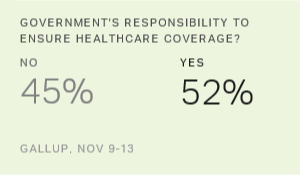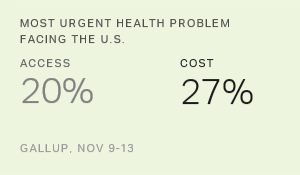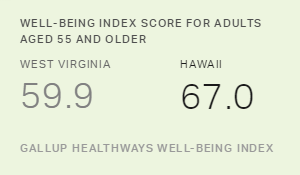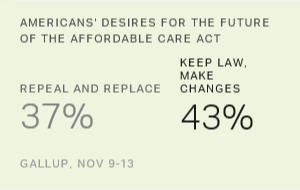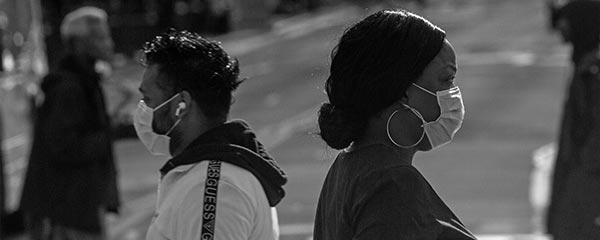Story Highlights
- Slight majority says healthcare is a government responsibility
- Majority continues to favor system based on private insurance
- Party divisions reflected in views on both questions
WASHINGTON, D.C. -- Slightly more Americans agree (52%) than disagree (45%) that the federal government is responsible for making sure all Americans have healthcare coverage. This balance of views is similar to last year but represents a shift from 2012 to 2014, when majorities said ensuring healthcare coverage for all was not the government's job.
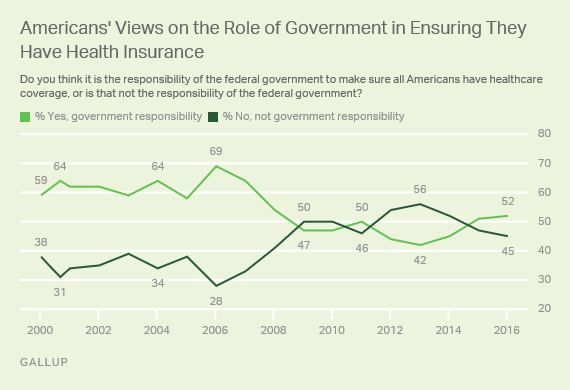
The latest findings are from Gallup's annual Health and Healthcare survey, conducted Nov. 9-13.
Compared with today, Americans were more widely inclined to say ensuring healthcare coverage is a federal responsibility between 2000 and 2008, with majorities of 54% to 69% saying this. But as President Barack Obama's Affordable Care Act was debated and implemented, the issue became politicized, leading to a nearly even division on the question from 2009 to 2011.
By 2012, sentiment against healthcare being a government responsibility swelled to 54%, and it remained the majority view through 2014. But last year's poll found Americans shifting more toward the view that the government should ensure all have healthcare, and this holds today.
Smaller Majority Prefers Private Healthcare System
When asked if they would prefer a government-run healthcare system or a system based on private insurance, majorities of Americans have consistently said they prefer a private system. However, this year's 10-percentage-point gap in favor of a private system (53%) compared with a government system (43%) is the narrowest in Gallup's trend.
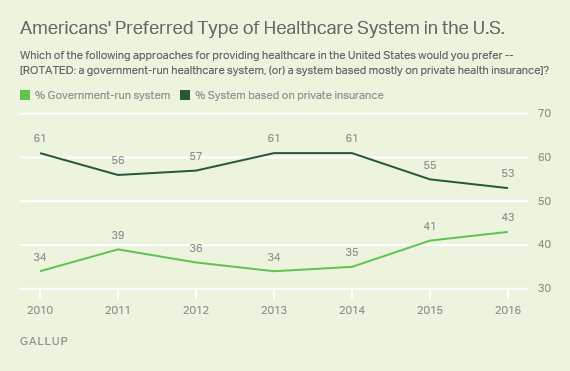
Parties Split in Views on Healthcare Responsibility, Approach
When Americans' views on both questions are assessed, they largely fall into two similarly sized camps. One group, capturing 39% of the public, consists of those who say ensuring healthcare for all is not the government's responsibility and would prefer a system based on private insurance. The other group, 35%, consists of Americans who say it is the government's responsibility to provide healthcare and would prefer a government-run healthcare system. A much smaller 14% believe it's the government's responsibility make sure everyone has healthcare, but want the system itself to be based on private insurance.
Nearly three-quarters of Republicans (72%) fall into the "free-enterprise group," saying it is not the government's responsibility and preferring a system based on private insurance. Meanwhile, a majority of Democrats (56%) fall into the "pro-government group," contending that it is the government's responsibility to provide healthcare and preferring a government-run system. Roughly equal percentages of Democrats believe it is the government's responsibility to ensure insurance coverage but prefer a private system (16%) or take the "free-enterprise" view (14%).
Independents are evenly split between the two major groups, with 36% falling into each.
| National adults | Republicans | Independents | Democrats | ||||||||||||||||||||||||||||||||||||||||||||||||||||||||||||||||||||||||||||||||||||||||||||||||
|---|---|---|---|---|---|---|---|---|---|---|---|---|---|---|---|---|---|---|---|---|---|---|---|---|---|---|---|---|---|---|---|---|---|---|---|---|---|---|---|---|---|---|---|---|---|---|---|---|---|---|---|---|---|---|---|---|---|---|---|---|---|---|---|---|---|---|---|---|---|---|---|---|---|---|---|---|---|---|---|---|---|---|---|---|---|---|---|---|---|---|---|---|---|---|---|---|---|---|---|
| % | % | % | % | ||||||||||||||||||||||||||||||||||||||||||||||||||||||||||||||||||||||||||||||||||||||||||||||||
| Government should ensure/Prefer government system | 35 | 8 | 36 | 56 | |||||||||||||||||||||||||||||||||||||||||||||||||||||||||||||||||||||||||||||||||||||||||||||||
| Government should ensure/Prefer private system | 14 | 12 | 15 | 16 | |||||||||||||||||||||||||||||||||||||||||||||||||||||||||||||||||||||||||||||||||||||||||||||||
| Government should not ensure/Prefer government system | 6 | 4 | 7 | 7 | |||||||||||||||||||||||||||||||||||||||||||||||||||||||||||||||||||||||||||||||||||||||||||||||
| Government should not ensure/Prefer private system | 39 | 72 | 36 | 14 | |||||||||||||||||||||||||||||||||||||||||||||||||||||||||||||||||||||||||||||||||||||||||||||||
| Undesignated * | 6 | 4 | 5 | 8 | |||||||||||||||||||||||||||||||||||||||||||||||||||||||||||||||||||||||||||||||||||||||||||||||
| *Undesignated row represents the percentage who had no opinion on either or both questions. | |||||||||||||||||||||||||||||||||||||||||||||||||||||||||||||||||||||||||||||||||||||||||||||||||||
| GALLUP | |||||||||||||||||||||||||||||||||||||||||||||||||||||||||||||||||||||||||||||||||||||||||||||||||||
Bottom Line
Americans' views on the federal government's responsibility in ensuring healthcare coverage and whether government or the private sector should run the healthcare system have fluctuated over time, but remain similar to where they were last year.
President-elect Donald Trump has promised to repeal and replace the Affordable Care Act, but has said he'd like to keep certain elements of the current system -- such as forcing insurers to cover adults with pre-existing conditions and allowing parents' insurance to cover their children until they are 26.
While the details of what could replace the ACA are still unknown, slight majorities of Americans favor government ensuring healthcare coverage and, separately, a system based on private insurance -- both of which are major elements of the act as it currently stands. This could complicate the president-elect's efforts to undo the ACA while appealing to the interests of the Americans who recently elected him.
Historical data are available in Gallup Analytics.
Survey Methods
Results for this Gallup poll are based on telephone interviews conducted Nov. 9-13, 2016, with a random sample of 1,019 adults, aged 18 and older, living in all 50 U.S. states and the District of Columbia. For results based on the total sample of national adults, the margin of sampling error is ±4 percentage points at the 95% confidence level. All reported margins of sampling error include computed design effects for weighting.
Each sample of national adults includes a minimum quota of 60% cellphone respondents and 40% landline respondents, with additional minimum quotas by time zone within region. Landline and cellular telephone numbers are selected using random-digit-dial methods.
View survey methodology, complete question responses and trends.
Learn more about how the Gallup Poll Social Series works.
